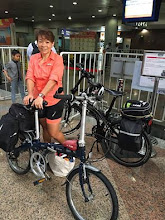Languages and what it means to be Malaysian
As usual, my brain has gone on overdrive at night. I started to think about what it is to be Malaysian. Is it about being multi-racial? We keep being reminded about being multi-racial and how we are all very tolerant about other races. Alright, I need to put this in. I do not want to be tolerant of other races. Being tolerant means we really do not agree or like what we see or experience, we're just tolerating. I want to acknowledge and embrace our differences, which I believe was what our ancestors did. A good example is the Peranakan culture. What is Nyonya food? It is unique in that it's cooking with local spices and ingredient. Some believe that the Peranakan are also born from inter-marriages of different races. This was before we had feel-good TV commercials and newspaper ads during Merdeka Day to remind us about being multi-racial and how tolerant we are.
To me being Malaysian means having the best of all worlds, whether it is the east or west or anywhere in between.
Most Malaysian families speak several dialects or languages. I personally speak Hokkien, Cantonese, speak but do not read Mandarin, understand but do not speak Hakka, speak and write English and Bahasa Malaysia. At home with my parents, we spoke Hokkien. I picked up Cantonese from playing with friends and from school. Was tutored in Mandarin by a super-boring teacher, which may explain why I didn't learn very much of the language. Obviously, English and BM was learnt in school. How did I begin to understand Hakka? That is a mystery to me. My father spoke fluent Hakka, having been born and raised in Kampar. He didn't use to speak it with me. What is more bizarre is my uncle's family. My uncle who is Hokkien, married a lady from a Cantonese family. They have 4 children. My cousins spoke Hokkien with their father and Cantonese with their mother. Oldest two speak to each other in Cantonese, youngest two speak to each other in Hokkien. When they all get together, they speak in Hokkien. Being in the same room with them is quite amazing. They switch from Cantonese to Hokkien depending on whom they were speaking to.
I grew up in a family with Peranakan roots who speaks Penang Hokkien. Both sets of grandmothers wore sarong and kebaya and wore their hair in a sanggul. When I hear Nyonya ladies talk about cooking, it goes something like this. Whole conversation will be in Hokkien but Penang Nyonya style:
"First, you must use batu giling and giling the rempah together. Then you tumis the rempah until it's fragrant. Then you tambah the...." When the food is cooked, it's sometimes served on a piring. Of course, food served with sambal belacan always tastes better. And the Nyonya ladies will agree that the freshest and cheapest food is from the pasaat (pasar=market).
Or when a mother tells her child to take a bath:
"Use sabun to wash yourself. Remember to cebuk huh. Then dry yourself with a tuala."
When a visitor comes to the house, the host or hostess will ask if he wants to drink teh or kopi. Of course the beverage is prepared in a tekoh. With the beverage, the visitor will be served some kuih.
When someone is in need, we tolong the person. If the person is taking a nap, we remember not to kacau. When we want a bit of fresh air, we go for a ride in a motorcar. When we meet someone who is rather eccentric, he/she is referred to as tengah masak. When a child jumps around and makes a lot of noise, that behaviour is like a monkey which had touched belacan (Obviously from the Malay saying, "kera kena belacan"). And boys do not like to be botak.
Alright, I'm going to stop rambling now.






6 Comments:
I know exactly what u mean..
haha, it was really turning into a ramble. but point well made. especially the part 'i don't want to tolerate, i want to embrace'. well said! being exposed to so may different culture right here, without having to travel all over, we should take the opportunity and embrace it all.
i like this best..
"gostan"
my paternal g-ma said that a many time to my g-pa..(penang-mari also, but foochow!!)
hee hee!
Ya, mott. That must be most Malaysian of all. Where else you can get a term like "gostan"? And anyone ever wondered how "going outstation" came about for going out of town?
Oh yea, my 91 y/o grandma still eat with her hands and wore sarong the whole dayyyyyyyyyy! Oh, you forgot the "jiak loti" (eat bread). lol.
Hijackqueen's "jiak loti" reminds me of the two Hokkien speaking guys in a Penang nightclub requesting the DJ to play the song, "Ah Cheng buay loti". Of course there's was lots of "where got"? and "ou laaa"! "Mana ou 'Ah Cheng buay loti' song"?
The manager then got involved and after some head scratching said,"ahh you want that song 'unchained Melody',right"? "Si la"..replied the two Hokkien guys.
Post a Comment
Subscribe to Post Comments [Atom]
<< Home